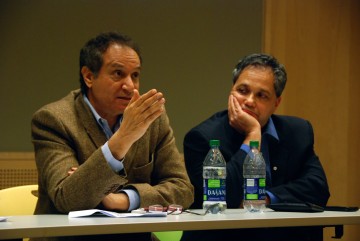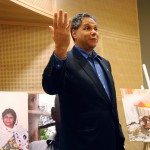 On Wednesday, October 26th, 2011, Dr. Abdallah Daar and Dr. Peter Singer presented their new book The Grandest Challenge at the Michael Smith Laboratories Auditorium. Videsh Kapoor was moderator of the discussion, which was cosponsored by UBC Department of Family Practice and NGDI. The following book review was written by UBC Nursing student Sara Eftekhar, who was also present at the event. The review can also be found here.
On Wednesday, October 26th, 2011, Dr. Abdallah Daar and Dr. Peter Singer presented their new book The Grandest Challenge at the Michael Smith Laboratories Auditorium. Videsh Kapoor was moderator of the discussion, which was cosponsored by UBC Department of Family Practice and NGDI. The following book review was written by UBC Nursing student Sara Eftekhar, who was also present at the event. The review can also be found here.
From Lab to Village: The Grandest Challenge Book Review
Dr. Daar and Dr. Singer, co-authors of a new book titled The Grandest Challenge are both passionate about improving the lives of people living in the developing world by linking and applying modern technology to communities in developing countries. On October 28th at UBC, they took the audience on a journey with photos to discuss their new book.
It is a sad and true fact that a person’s life expectancy is determined by where they live in the world.
“Our inspiration comes from one simple fact: if your home is in Canada, the United States, or Germany, you can expect to live into your eighties. If your home is in Swaziland, Mozambique, or Zambia, your life expectancy is half that long”
These words are written in bold letters on the cover of the The Grandest Challenge: Taking Life-Saving Science from Lab to Village. Drs. Abdallah Daar and Peter Singer, the coauthors of the book are determined to bridge this global health gap using technology and innovation.
Dr. Daar, a professor of Public Health Sciences and of Surgery at the University of Toronto and the director of Ethics and Commercialization at the McLaughlin-Rotman Centre for Global Health started his journey in global health when he received tragic news that his sister had died of malaria in Tanzania. This caused him to step back and wonder how he could use his skills to help a wider range of people in the world instead of the few patients he had been treating in Canada.
Dr. Singer, the Chief Executive Officer of Grand Challenges Canada and director at the McLaughlin- Rotman Centre for Global Health, University Health Network and University of Toronto, worked with Dr. Daar 12 years ago and became exposed to global health issues through a variety of sources. Being an expert at bioethics, Dr. Singer found addressing inequities in health care as the heart of bioethics. “What makes it right or fair that a woman is 100x more likely to die during child birth in Africa than my wife. Also, what makes it fair that a child is 10x more likely to die under the age of five than my own kids. These are ethical questions I asked myself” explains Dr. Singer.
 Dr. Singer and Dr. Daar worked together discussing challenges in global health and came to the conclusion that innovation equals life. From there, they began with a study asking the scientific community to come up with the top 10 biotechnological priorities that have influenced or improved health in the developing world. However, Dr. Daar states that “science is necessary but not sufficient in improving global health”. In order to really effect change, an integrated approach between the public and private sectors, scientists and governments must be made because no sector can take on the challenges of the world alone and actually this isn’t too hard to achieve. For example, Dr. Singer explains that “earlier this year, a non-profit company from Seattle in partnership with the World Health Organization in Geneva, and with an Indian company outside of Mumbai, introduced a meningitis vaccine that costs less than 50 cents per dose. It is expected to save 130,000 lives over the next 10 years. This is what we would like to see more of and the book highlights several examples of how partnerships are being made through innovation”.
Dr. Singer and Dr. Daar worked together discussing challenges in global health and came to the conclusion that innovation equals life. From there, they began with a study asking the scientific community to come up with the top 10 biotechnological priorities that have influenced or improved health in the developing world. However, Dr. Daar states that “science is necessary but not sufficient in improving global health”. In order to really effect change, an integrated approach between the public and private sectors, scientists and governments must be made because no sector can take on the challenges of the world alone and actually this isn’t too hard to achieve. For example, Dr. Singer explains that “earlier this year, a non-profit company from Seattle in partnership with the World Health Organization in Geneva, and with an Indian company outside of Mumbai, introduced a meningitis vaccine that costs less than 50 cents per dose. It is expected to save 130,000 lives over the next 10 years. This is what we would like to see more of and the book highlights several examples of how partnerships are being made through innovation”.
Dr. Daar and Dr. Singer also helped set up Grand Challenges Canada, non-profit organization that supports local innovators to develop and market new technologies to improve health. They are inspired by the enthusiasm that students have in global health and they both believe that there needs to be more of a systemic approach to allow for young people to channel their energy and knowledge to benefit others.
The path from the lab to the village is far from simple; political, scientific, ethical, and commercial are just some barriers that exist in bridging the gaps between technology to people. Nonetheless, Dr. Daar and Dr. Singer remain optimistic and believe that this book will foster discussion about new possibilities in global health.
If you would like to learn more about the book you can follow the authors on Twitter at:
Dr. Paul Singer @PeterASinger and Dr. Abdallah Daar @AbdallahDaar